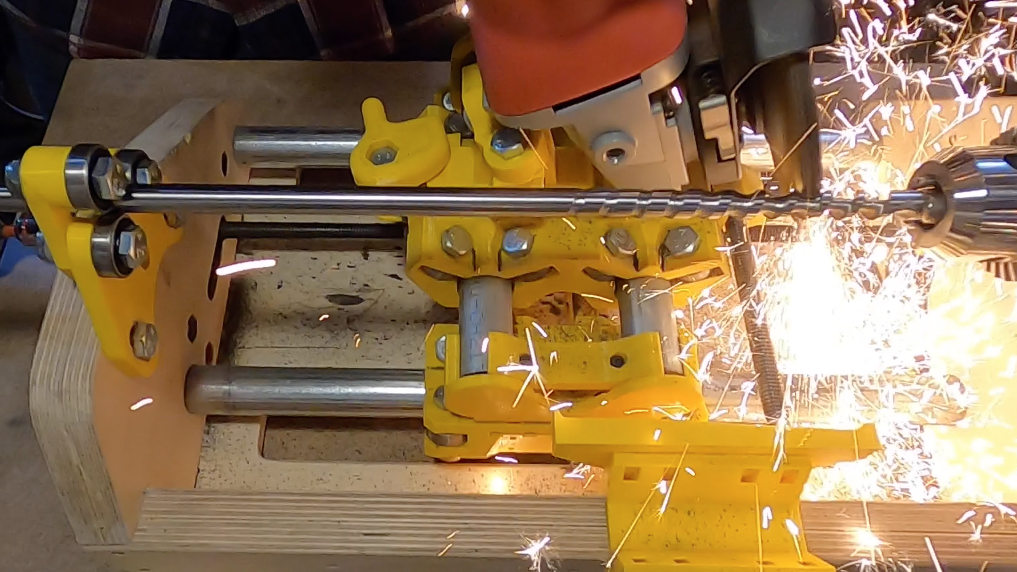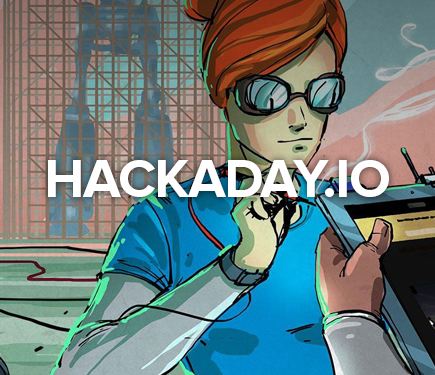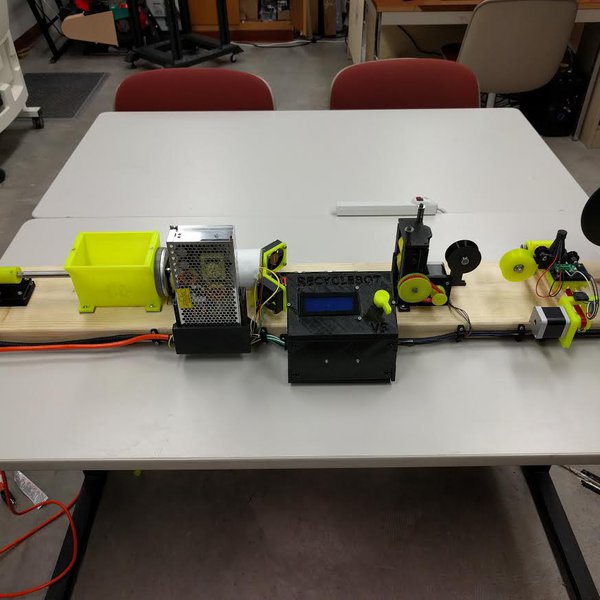 OK everyone, time to get started. I'm Dan, I'm the mod for today's Hack Chat with Dr. Joshua Pearce from Michigan Tech. He's here today to talk to us about open and sustainable engineering.
OK everyone, time to get started. I'm Dan, I'm the mod for today's Hack Chat with Dr. Joshua Pearce from Michigan Tech. He's here today to talk to us about open and sustainable engineering.
Joshua, I think you're signed on as @MOST, right?
 Yes - that is me - Hi Everyone!
Yes - that is me - Hi Everyone!
 Welcome! Can you maybe start us off with a little about your background and what your research focuses on?
Welcome! Can you maybe start us off with a little about your background and what your research focuses on?
 Sure- I am an engineering professor at Michigan Tech in the US, a visiting professor at Aalto University in Finland and Université de Lorraine, France. I run the Open Sustainability Technology Research Group. We develop open source appropriate technology to find collaborative solutions to problems in sustainability and poverty reduction. We take both the open source part and the sustainable part seriously. Kind of a Hack-a-Day approach for the poor – but a lot of the technologies have dual use. So for example, we do a lot of work in solar photovoltaic cells that convert sunlight into electricity. The solar panels on my garage are powering my Linux Mint laptop now, work just as well (and maybe a bit better) doing the same thing in a village in the developing world. Similarly, the RepRap 3-D printing, we use to make our own scientific tools can be used to make low cost medical equipment in the field or toys for our kids. All leveraging open source development to bring wealth even to those that do not have a lot of money.
Sure- I am an engineering professor at Michigan Tech in the US, a visiting professor at Aalto University in Finland and Université de Lorraine, France. I run the Open Sustainability Technology Research Group. We develop open source appropriate technology to find collaborative solutions to problems in sustainability and poverty reduction. We take both the open source part and the sustainable part seriously. Kind of a Hack-a-Day approach for the poor – but a lot of the technologies have dual use. So for example, we do a lot of work in solar photovoltaic cells that convert sunlight into electricity. The solar panels on my garage are powering my Linux Mint laptop now, work just as well (and maybe a bit better) doing the same thing in a village in the developing world. Similarly, the RepRap 3-D printing, we use to make our own scientific tools can be used to make low cost medical equipment in the field or toys for our kids. All leveraging open source development to bring wealth even to those that do not have a lot of money.
 For context, this is where I first heard about your work:
For context, this is where I first heard about your work:

Open-Source Grinder Makes Compression Screws For Plastic Extruders Easy
In a world that's literally awash in plastic waste, it seems a pity to have to buy fresh rolls of plastic filament to feed our 3D-printers, only to have them generate yet more plastic waste.
 I just loved the flexibility of that jig, and its simplicity
I just loved the flexibility of that jig, and its simplicity
 Thanks Dan - that is actually a really good example of combining a bunch of research together. The components are mostly RepRap https://reprap.org/wiki/RepRap 3-D printed
Thanks Dan - that is actually a really good example of combining a bunch of research together. The components are mostly RepRap https://reprap.org/wiki/RepRap 3-D printed
![]() Wow, i hadn't made that connection. I already checked your other projects here on HackaDay and that one.
Wow, i hadn't made that connection. I already checked your other projects here on HackaDay and that one.
 Yeah, MOST has a ton of project on hackaday.io.
Yeah, MOST has a ton of project on hackaday.io.
 Thanks Nicolas. The goal for us was to be able to research different kinds of compression screws to make low cost direct drive pellet/ particle 3-D printers like this study https://www.liebertpub.com/doi/10.1089/3dp.2019.0195
Thanks Nicolas. The goal for us was to be able to research different kinds of compression screws to make low cost direct drive pellet/ particle 3-D printers like this study https://www.liebertpub.com/doi/10.1089/3dp.2019.0195

https://hackaday.io/projects/hacker/239245
Hackaday.io Projects
Hackaday.io is a platform for people who like to build things.
 Have those screws made it into a printer yet? I'd love to see that build.
Have those screws made it into a printer yet? I'd love to see that build.
![]() @MOST -- I think I first became aware of your work when you were starting the open-source lab-equipment work a number of years back. I have looked at some of the projects published in HardwareX with interest.
@MOST -- I think I first became aware of your work when you were starting the open-source lab-equipment work a number of years back. I have looked at some of the projects published in HardwareX with interest.

 We have already shown that direct printing shredded waste on a large scale with a re:3D GigabotX works really well - https://www.appropedia.org/Fused_Particle_Fabrication_3-D_Printing:_Recycled_Materials%E2%80%99_Optimization_and_Mechanical_Properties
We have already shown that direct printing shredded waste on a large scale with a re:3D GigabotX works really well - https://www.appropedia.org/Fused_Particle_Fabrication_3-D_Printing:_Recycled_Materials%E2%80%99_Optimization_and_Mechanical_Properties
 Cool!
Cool!
![]() I come at this from a chemistry / materials science perspective. Seeing low-cost equipment fill in where crazy expensive stuff is normally needed is always heart-warming.
I come at this from a chemistry / materials science perspective. Seeing low-cost equipment fill in where crazy expensive stuff is normally needed is always heart-warming.
But in your opinion -- is there any basic lab equipment used in the sciences where there is still a need to "go pro" and home-brew, Arduino- or RPi-based solutions are either not good enough or too difficult to make? In other words, where are the big challenges in open-source lab equipment?
 @DPM we are putting them in this 3-headed beast the open source high T printer the Cereberus this semester - https://doi.org/10.1016/j.ohx.2020.e00130
@DPM we are putting them in this 3-headed beast the open source high T printer the Cereberus this semester - https://doi.org/10.1016/j.ohx.2020.e00130
 @jwosnick Thanks - HardwareX has really taken off in the last few years - more than 100 free fully vetted designs have been published. We are currently running a special issue for COVID19 Medical Hardware https://www.sciencedirect.com/journal/hardwarex/special-issue/1037TX0Z2W8
@jwosnick Thanks - HardwareX has really taken off in the last few years - more than 100 free fully vetted designs have been published. We are currently running a special issue for COVID19 Medical Hardware https://www.sciencedirect.com/journal/hardwarex/special-issue/1037TX0Z2W8
All fees are waived
 @jwosnick Thanks - that is a great question -- we have been climbing the ladder of sophistication as an open hardware community. The really big high end stuff is still out of reach. Tools like for microscale science SEMs, TEMs, FIBs, I don't think there is any reason someone could not get to a good SEM and post it in on Hackaday - it is really just time. In many ways we are building towards that kind of tech now.
@jwosnick Thanks - that is a great question -- we have been climbing the ladder of sophistication as an open hardware community. The really big high end stuff is still out of reach. Tools like for microscale science SEMs, TEMs, FIBs, I don't think there is any reason someone could not get to a good SEM and post it in on Hackaday - it is really just time. In many ways we are building towards that kind of tech now.
![]() Hi, I wanted take part here, since photovoltasics and diy come in one topic. This is my first Hack-Chat, but I do Electronics for quite some years. In professional work, I am working in a photovoltaic research institute in Germany and I am especially responsible for electrical characterization of PV-modules outdoors and indoors.
Hi, I wanted take part here, since photovoltasics and diy come in one topic. This is my first Hack-Chat, but I do Electronics for quite some years. In professional work, I am working in a photovoltaic research institute in Germany and I am especially responsible for electrical characterization of PV-modules outdoors and indoors.
My current most anticipated project is to create a low-budget PV-module i-v-curve-sweeper and mpp-load
![]() I am wondering when open-source spectrometry tools commonly used in chemistry (e.g. infrared spectroscopy, nuclear magnetic resonance, etc.) will get the open-hardware treatment. Perhaps they have already.
I am wondering when open-source spectrometry tools commonly used in chemistry (e.g. infrared spectroscopy, nuclear magnetic resonance, etc.) will get the open-hardware treatment. Perhaps they have already.
![]() @jwosnick https://www.open-raman.org/ for example
@jwosnick https://www.open-raman.org/ for example
 @jwosnick https://hackaday.io/project/1342-open-spectrometer
@jwosnick https://hackaday.io/project/1342-open-spectrometer
 snap
snap
 Yes it would be great to have the full compliment of chem tools too like FTIR. There has been a little bit of OS work on spectrometry at the Public Labs. We have done some really basic colorimetry for water quality and then amped it up a little bit for nitrates. https://www.appropedia.org/Open-Source_Photometric_System_for_Enzymatic_Nitrate_Quantification
Yes it would be great to have the full compliment of chem tools too like FTIR. There has been a little bit of OS work on spectrometry at the Public Labs. We have done some really basic colorimetry for water quality and then amped it up a little bit for nitrates. https://www.appropedia.org/Open-Source_Photometric_System_for_Enzymatic_Nitrate_Quantification

https://hackaday.io/project/27066-recyclebot
Recyclebot
A low-cost, open source, self-replicating rapid prototyper ( RepRap) has been developed, which greatly expands the potential user base of rapid prototypers. The operating cost of the RepRap can be further reduced using waste polymers as feedstock. Centralized recycling of polymers is often uneconomic and energy intensive due to transportation embodied energy.
 Hey Lex!
Hey Lex!

 @Lex Kravitz Thank you! - -The recyclebot is one of our favorites too - we are just about done testing a single web cam computer vision system to work as the diameter sensor...lower cost and better than that system. We also haven't started moving the compression screw technology over to it yet -- so still a lot of work to do on it. It is awesome for pellets and well-shaped plastic waste....gets worse with particles that do not flow well.
@Lex Kravitz Thank you! - -The recyclebot is one of our favorites too - we are just about done testing a single web cam computer vision system to work as the diameter sensor...lower cost and better than that system. We also haven't started moving the compression screw technology over to it yet -- so still a lot of work to do on it. It is awesome for pellets and well-shaped plastic waste....gets worse with particles that do not flow well.

![]() In terms of what can be built with relatively basic tools, there is a desalination project from MIT that uses aerogels to filter out the water in layers? It seems like it is close to something that could be made with too much effort. http://news.mit.edu/2020/passive-solar-powered-water-desalination-0207
In terms of what can be built with relatively basic tools, there is a desalination project from MIT that uses aerogels to filter out the water in layers? It seems like it is close to something that could be made with too much effort. http://news.mit.edu/2020/passive-solar-powered-water-desalination-0207
 Randomly - does making a box camera out of Amazon boxes count as sustainable engineering? It's reuse before recycling.
Randomly - does making a box camera out of Amazon boxes count as sustainable engineering? It's reuse before recycling.
 The big question remains unanswered for waste 3-D printing which knocks the cost of 3D printed products down to < ten cents a kg -- should you 1) go the step of making filament so you can use a normal fused filament printer and have control at the cost of time and complexity of the recyclebot...or 2) go to a direct waste FPF or FGF printer and lose a little control but gain one cycle on your plastic and time and cost.
The big question remains unanswered for waste 3-D printing which knocks the cost of 3D printed products down to < ten cents a kg -- should you 1) go the step of making filament so you can use a normal fused filament printer and have control at the cost of time and complexity of the recyclebot...or 2) go to a direct waste FPF or FGF printer and lose a little control but gain one cycle on your plastic and time and cost.
 @Marco Pfeffer, have you taken a look at this work? https://core.ac.uk/download/pdf/82753817.pdf
@Marco Pfeffer, have you taken a look at this work? https://core.ac.uk/download/pdf/82753817.pdf
 Off the top of my head, I'd say with so many cheap FDM 3D printers on the market, it makes more sense to supply filament for them than try to reinvent that particular wheel. Just IMHO, of course.
Off the top of my head, I'd say with so many cheap FDM 3D printers on the market, it makes more sense to supply filament for them than try to reinvent that particular wheel. Just IMHO, of course.


 @cmcrann That is a really interesting take to push the efficiency up - with multistages -- that would be a pretty sweet 3D printing application -- the solar water work we have done is simpler. It can only pasteurize - not full desal. http://www.mdpi.com/2411-9660/2/2/11
@cmcrann That is a really interesting take to push the efficiency up - with multistages -- that would be a pretty sweet 3D printing application -- the solar water work we have done is simpler. It can only pasteurize - not full desal. http://www.mdpi.com/2411-9660/2/2/11
 Speaking of solar, we used to see so much non-PV solar, like water heating, etc. Why has solar seemingly become all about PV? Seems like applications like the above have a lot of potential too.
Speaking of solar, we used to see so much non-PV solar, like water heating, etc. Why has solar seemingly become all about PV? Seems like applications like the above have a lot of potential too.
 The water purifier is pretty cool. Though the convenience of a tube in tube heat exchange is hard to beat, from both cost and efficiency prospectives. Sensibly I'd use that for brewing, but no, sensible didn't happen and I have a plate exchange that clogs up with grain.
The water purifier is pretty cool. Though the convenience of a tube in tube heat exchange is hard to beat, from both cost and efficiency prospectives. Sensibly I'd use that for brewing, but no, sensible didn't happen and I have a plate exchange that clogs up with grain.
 @julianoleal86 That is also really slick - the OS development in PV is getting there - as you point out the electronics we have good options, many of the cell designs that get out are essentially OS, and there are a few decent racking designs....to go all the way and really make cells that you can produce yourself...that is a challenge. A few of the organic PV and dye sensitized types are good options. We have been aiming at this but rather slowly - We did a slot die system for making them https://www.academia.edu/35667969/Open-source_Parametric_3-D_Printed_Slot_Die_System_for_Thin_Film_Semiconductor_Processing
@julianoleal86 That is also really slick - the OS development in PV is getting there - as you point out the electronics we have good options, many of the cell designs that get out are essentially OS, and there are a few decent racking designs....to go all the way and really make cells that you can produce yourself...that is a challenge. A few of the organic PV and dye sensitized types are good options. We have been aiming at this but rather slowly - We did a slot die system for making them https://www.academia.edu/35667969/Open-source_Parametric_3-D_Printed_Slot_Die_System_for_Thin_Film_Semiconductor_Processing

 The slot die are 3D printed and allows you to lay down a few tens of nm layers well.
The slot die are 3D printed and allows you to lay down a few tens of nm layers well.
![]() @julianoleal86 I haven't read it before. Thanks a lot. My approach will be even simpler but more prone to get broken when e.g. polarity is wrong. I am going to use an arduino with ADC ads1115 and one or more (parallel working) MOSFETs as electronic loads
@julianoleal86 I haven't read it before. Thanks a lot. My approach will be even simpler but more prone to get broken when e.g. polarity is wrong. I am going to use an arduino with ADC ads1115 and one or more (parallel working) MOSFETs as electronic loads
 @Dan Maloney Solar thermal really took a licking on the business front ironically because of its ease and success. When everyone can start a solar thermal company ...and they did - a lot of them were not that great and leaked and gave solar thermal a terrible rep in the US. In other countries they are huge - Turkey, Korea, etc. have them all over the place - they make a huge amount of sense. The best bang for your buck, however, is to combine them with PV! (in exergy - https://www.academia.edu/6105926/Optimizing_limited_solar_roof_access_by_exergy_analysis_of_solar_thermal_photovoltaic_and_hybrid_photovoltaic_thermal_systems)
@Dan Maloney Solar thermal really took a licking on the business front ironically because of its ease and success. When everyone can start a solar thermal company ...and they did - a lot of them were not that great and leaked and gave solar thermal a terrible rep in the US. In other countries they are huge - Turkey, Korea, etc. have them all over the place - they make a huge amount of sense. The best bang for your buck, however, is to combine them with PV! (in exergy - https://www.academia.edu/6105926/Optimizing_limited_solar_roof_access_by_exergy_analysis_of_solar_thermal_photovoltaic_and_hybrid_photovoltaic_thermal_systems)
![]() I think one reason so much attention is given to PV is simply because PV cells can be used for all kinds of things, where thermal solar applications tend to be single purpose.
I think one reason so much attention is given to PV is simply because PV cells can be used for all kinds of things, where thermal solar applications tend to be single purpose.
 Today PV is huge because it makes so much economic sense - it is normally the lowest cost power - so huge companies and the utilities are all over it in the US and throughout the rest of the world. I really am in favor of the distributed kind. We still need a true plug and play microinverter that can be plugged into low voltage outlets. The market is huge! ....and it would save at least $13B/year for consumers in the US alone. https://www.academia.edu/29941674/U.S._Market_for_Solar_Photovoltaic_Plug-and-Play_Systems
Today PV is huge because it makes so much economic sense - it is normally the lowest cost power - so huge companies and the utilities are all over it in the US and throughout the rest of the world. I really am in favor of the distributed kind. We still need a true plug and play microinverter that can be plugged into low voltage outlets. The market is huge! ....and it would save at least $13B/year for consumers in the US alone. https://www.academia.edu/29941674/U.S._Market_for_Solar_Photovoltaic_Plug-and-Play_Systems
 @Lightning Phil Sure - you are making use of a massive waste product...Amazon packaging!
@Lightning Phil Sure - you are making use of a massive waste product...Amazon packaging!
![]() @MOST I agree, would be great to see. You say low voltage outlets, you mean household 120v?
@MOST I agree, would be great to see. You say low voltage outlets, you mean household 120v?
 Hi Joshua, I love what you do at MOST! I'm working in the open source hardware field too. My concern is that to have a real impact, we need more companies working with a business model around open hardware, otherwise all these great projects will stay in an academic or hobbyist context. There are a few great examples (like Prusa or Arduino), but for most business people open hardware is a very alien concept (Try to get VC money for a open hardware project!). What's your take on this? Do you see things changing in that regard, slowly at least?
Hi Joshua, I love what you do at MOST! I'm working in the open source hardware field too. My concern is that to have a real impact, we need more companies working with a business model around open hardware, otherwise all these great projects will stay in an academic or hobbyist context. There are a few great examples (like Prusa or Arduino), but for most business people open hardware is a very alien concept (Try to get VC money for a open hardware project!). What's your take on this? Do you see things changing in that regard, slowly at least?
 @Dan Brinks Yes 120V - we looked at the legality of it and it is possible to meet code. (apologies this is my most boring paper ever https://www.academia.edu/26379506/A_Review_of_Technical_Requirements_for_Plug-and-Play_Solar_Photovoltaic_Microinverter_Systems_in_the_United_States ) ...but to really make it happen in the US market I think it would need to be coupled to tech that doesnt allow any grid feedback under any circumstance.
@Dan Brinks Yes 120V - we looked at the legality of it and it is possible to meet code. (apologies this is my most boring paper ever https://www.academia.edu/26379506/A_Review_of_Technical_Requirements_for_Plug-and-Play_Solar_Photovoltaic_Microinverter_Systems_in_the_United_States ) ...but to really make it happen in the US market I think it would need to be coupled to tech that doesnt allow any grid feedback under any circumstance.
![]() Having worked for a company that combined PV and Thermal for residential use, one of the factors that doomed the project was the installation costs. Our energy/m^2 was more than triple pure PV (significantly more on hot days where we were actively cooling the PV and had use for local hot water), but that didn't matter much if you needed an electrician, HVAC, plumber, and roofer all to be on-site at the /same/ time for an installation. Most installations aren't limited by square footage, so adding a couple more PV panels is an easier solution to install and to get financed.
Having worked for a company that combined PV and Thermal for residential use, one of the factors that doomed the project was the installation costs. Our energy/m^2 was more than triple pure PV (significantly more on hot days where we were actively cooling the PV and had use for local hot water), but that didn't matter much if you needed an electrician, HVAC, plumber, and roofer all to be on-site at the /same/ time for an installation. Most installations aren't limited by square footage, so adding a couple more PV panels is an easier solution to install and to get financed.
![]() @MOST thanks for sharing. I will read it
@MOST thanks for sharing. I will read it
 @Andreas Kahler Thanks Andreas -- I agree I would really like to see more OSH businesses do well even at the SME scale - they do not need to become the RedHat of a specific widget. We looked at how this would work for scientific equipment-based businesses http://doi.org/10.5334/joh.4 and I think there is some hope- I haven't seen a surge of pure OS businesses - but I think we can see a lot of major companies leaning into open hardware like Tesla.
@Andreas Kahler Thanks Andreas -- I agree I would really like to see more OSH businesses do well even at the SME scale - they do not need to become the RedHat of a specific widget. We looked at how this would work for scientific equipment-based businesses http://doi.org/10.5334/joh.4 and I think there is some hope- I haven't seen a surge of pure OS businesses - but I think we can see a lot of major companies leaning into open hardware like Tesla.
![]() Interesting, thanks @MOST. My understanding was that the tech is there (and in use in other countries) - but utility providers/UL won't get behind it here in the states as it would completely upset the utility provider market
Interesting, thanks @MOST. My understanding was that the tech is there (and in use in other countries) - but utility providers/UL won't get behind it here in the states as it would completely upset the utility provider market
 Thx @MOST for the link. Will read it!
Thx @MOST for the link. Will read it!

 @Dan Brinks Yep -- we are already in a series of major battles all throughout the US. The region I am in (upper Michigan) enables double digit ROIs for home-based PV....but our region just hit the arbitrary cap of 2% distributed generation set by the utility. It is a crime - because even in cold cloudly MI the pretty much everyone would profit from solar https://doi.org/10.3390/en12040674
@Dan Brinks Yep -- we are already in a series of major battles all throughout the US. The region I am in (upper Michigan) enables double digit ROIs for home-based PV....but our region just hit the arbitrary cap of 2% distributed generation set by the utility. It is a crime - because even in cold cloudly MI the pretty much everyone would profit from solar https://doi.org/10.3390/en12040674
 Oof! I'm interested in that article but don't think I'm willing to give access to my contact to do so.
Oof! I'm interested in that article but don't think I'm willing to give access to my contact to do so.
 Here in MI also, I had solar panels put in for the house 2017 and about a year afterwards DTE was able to get the MI legislature to allow DTE to not reimburse people for their power they generate after 2029
Here in MI also, I had solar panels put in for the house 2017 and about a year afterwards DTE was able to get the MI legislature to allow DTE to not reimburse people for their power they generate after 2029
 I agree the labor with 3 specialists for PVT is rough -- ideally we would be doing this first in new homes where we could really make it work. The other area that European PV systems pepole are really hammering on is PV +heat pumps-- -it is impressive - I just hope they can expand the market fast and make it global.
I agree the labor with 3 specialists for PVT is rough -- ideally we would be doing this first in new homes where we could really make it work. The other area that European PV systems pepole are really hammering on is PV +heat pumps-- -it is impressive - I just hope they can expand the market fast and make it global.
![]() @Dan Brinks same here in Germany. All PV enthusiasts for the so called balcony pv are officially blocked for reasons of safety. And partly I do agree on the argument that a too high current in the home grid will lead to defects since there's no Fuse on each power socket
@Dan Brinks same here in Germany. All PV enthusiasts for the so called balcony pv are officially blocked for reasons of safety. And partly I do agree on the argument that a too high current in the home grid will lead to defects since there's no Fuse on each power socket
 @cyplesma The MI energy system is a disgrace -- unless it changes the only real option is grid defection. https://www.academia.edu/25363058/Emerging_Economic_Viability_of_Grid_Defection_in_a_Northern_Climate_Using_Solar_Hybrid_Systems
@cyplesma The MI energy system is a disgrace -- unless it changes the only real option is grid defection. https://www.academia.edu/25363058/Emerging_Economic_Viability_of_Grid_Defection_in_a_Northern_Climate_Using_Solar_Hybrid_Systems
 @Patrick Van Oosterwijck Are you talking about the Academia links? If you go to it with a private browser you should be able to get right to it.
@Patrick Van Oosterwijck Are you talking about the Academia links? If you go to it with a private browser you should be able to get right to it.
 yeaup, and I personally living in rural area have no problem with that, but I certainly understand how hard it would be for folks not in rural areas
yeaup, and I personally living in rural area have no problem with that, but I certainly understand how hard it would be for folks not in rural areas
![]() I have a single 100w panel and two 7.5ah batteries, with about three hours of sun a day. I found out I can power a surprising amount of things in the apartment. Not exactly grid defection however.
I have a single 100w panel and two 7.5ah batteries, with about three hours of sun a day. I found out I can power a surprising amount of things in the apartment. Not exactly grid defection however.
 @MOST thanks I did a different login (not with Google) and the only thing I had to do there was follow someone. :)
@MOST thanks I did a different login (not with Google) and the only thing I had to do there was follow someone. :)
 That is really good -- for real grid defection it is possible with a big battery bank in sunny regions (e.g. Hawaii, CA, etc.) but for MI we really need something else like a NG cogen...unfortunately, again the US market is immature, whereas you can buy them easily in Japan, Europe, etc.
That is really good -- for real grid defection it is possible with a big battery bank in sunny regions (e.g. Hawaii, CA, etc.) but for MI we really need something else like a NG cogen...unfortunately, again the US market is immature, whereas you can buy them easily in Japan, Europe, etc.
 Question on the software end of things: are there enough OS options for things like CAD/CAM so that building, say, a cheap direct extrusion recycling 3D-printer isn't hampered by the lack of affordable software to design things for it to create?
Question on the software end of things: are there enough OS options for things like CAD/CAM so that building, say, a cheap direct extrusion recycling 3D-printer isn't hampered by the lack of affordable software to design things for it to create?
 I'm thinking of adoption in developing countries in particular. But could be anywhere
I'm thinking of adoption in developing countries in particular. But could be anywhere
 @Dan Maloney Yes! Generally in our group we try to use FreeCAD https://www.freecadweb.org/ and OpenSCAD (which is a script based CAD - that I love) http://www.openscad.org/ The big challenge is the students -- those that come up through my 3D printing class have no problem https://en.wikiversity.org/wiki/Open_Source_3-D_Printing Others that learn NX, autocad, or solidworks have a hard time.
@Dan Maloney Yes! Generally in our group we try to use FreeCAD https://www.freecadweb.org/ and OpenSCAD (which is a script based CAD - that I love) http://www.openscad.org/ The big challenge is the students -- those that come up through my 3D printing class have no problem https://en.wikiversity.org/wiki/Open_Source_3-D_Printing Others that learn NX, autocad, or solidworks have a hard time.
 nice, was hoping FreeCAD would be the answer
nice, was hoping FreeCAD would be the answer
 I was using Fusion 360, but I switched my main machine to Linux and now I need to find another way. Thanks for the insights.
I was using Fusion 360, but I switched my main machine to Linux and now I need to find another way. Thanks for the insights.
 At this point we have a really nice completely OS tool chain from the CAD, PCBs with KiCAD https://kicad-pcb.org/ a bunch of great OS RepRap firmware, slicers and controllers....so you can go really really far.
At this point we have a really nice completely OS tool chain from the CAD, PCBs with KiCAD https://kicad-pcb.org/ a bunch of great OS RepRap firmware, slicers and controllers....so you can go really really far.
![]() @MOST If your budget increased by 20x tomorrow, what times of projects would you like to take on that you don't have the bandwidth or $ to tackle right now?
@MOST If your budget increased by 20x tomorrow, what times of projects would you like to take on that you don't have the bandwidth or $ to tackle right now?
Are there projects that you personally _don't_ want to take on, but wish somebody else would, because it would make your team's efforts that much easier?
 So I see that I tried to squeeze one question in right at the end of our hour. We need to let Dr. Pearce get back to work, but the channel is open so let the discussion continue if there are still questions. I want to say thanks to Dr. Pearce for the time today, and to everyone for coming in with great questions.
So I see that I tried to squeeze one question in right at the end of our hour. We need to let Dr. Pearce get back to work, but the channel is open so let the discussion continue if there are still questions. I want to say thanks to Dr. Pearce for the time today, and to everyone for coming in with great questions.

 @Scott_A That is a really hard one - I really want a complete materials database for every product - so you scan the QR code and know exactly what is in it -- it would make recycling about 1000x easier. Today even 3D printer filament suppliers don't know what the colorants and additives are in their own product. I would love to see OS DIY digitally manufacturable electronics take way off. As well as all of the big stuff that is more in the Open Source Ecology wheelhouse https://www.opensourceecology.org/gvcs/ There is such a long way to go on these things -
@Scott_A That is a really hard one - I really want a complete materials database for every product - so you scan the QR code and know exactly what is in it -- it would make recycling about 1000x easier. Today even 3D printer filament suppliers don't know what the colorants and additives are in their own product. I would love to see OS DIY digitally manufacturable electronics take way off. As well as all of the big stuff that is more in the Open Source Ecology wheelhouse https://www.opensourceecology.org/gvcs/ There is such a long way to go on these things -
![]() @Dan Maloney and @MOST thank you for great weblinks and documents
@Dan Maloney and @MOST thank you for great weblinks and documents
 Thank you everyone!!
Thank you everyone!!
 Thanks all! And next week we'll be switching it up with Pocket NC:
Thanks all! And next week we'll be switching it up with Pocket NC:

https://hackaday.io/event/173786-cnc-on-the-desktop-hack-chat
CNC on the Desktop Hack Chat
Is that a CNC machine in your pocket? Wednesday, August 26, 2020 12:00 pm PDT Local time zone: Hack Chat This event was created on 07/16/2020 and last updated a day ago. Join this event's team Matt Hertel and John Allwine will host the Hack Chat on Wednesday, August 26, 2020 at noon Pacific Time.
 Dan Maloney
Dan Maloney



Discussions
Become a Hackaday.io Member
Create an account to leave a comment. Already have an account? Log In.